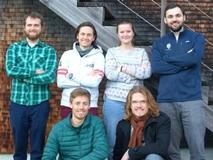Startups developing a new gas compression machine based on scroll technology, a small autonomous rover, a microbial-based therapy for Colorectal cancer, and a DIY plant-based meat miner each win CHF 10,000
28.04.2022
Beyond Scroll, Caterra, Recolony, and VOLF win Venture Kick's first financial and entrepreneurial support stage. Their projects unlock the benefits of hydrogen as a fuel by offering a totally oil-free low-power compressor based on scroll technology and on an innovative design enabling an oil-free transmission mechanism too, offer a small autonomous rover that drives through the field and removes weeds close to the crops using a laser-based module, focus their efforts in developing cancer therapies that primarily consist of selected commensal bacteria of the gut microbiota, and empower everyone to produce authentic plant-based meat and contribute to the reduction of global meat consumption in the fight against the climate crisis.
 |
 Beyond Scroll Founders: CTIO Dr. Luis Mendoza, EMBA and CEO Dr. Marianna Fighera, MBA
|
 Caterra Team: Aurel Neff MSc. M.E. ETH and initiator of the project, Patrick Barton - MSc. Robotics ETH, computer vision, focus project SpaceBok, Madeleine Schuler - MSc. student in M.E. ETH with focus on robotics, Oswald Niederberger - Polymechanic with an organic agriculture background, manufacturing.
|
 Recolony: from left to right: R&D Manager Dr. Egle Katkeviciute, and co-founders Dr. Ana Montalban-Arques, Project Leader in the Wyss Zurich Translational Center at the University of Zurich, Dr. Philipp Busenhart, Business Development Manager
|
 VOLF: from left to right: Felix Wang (product usability lead), Kai v. Petersdorff (initiator), Linn Bieske (business lead), Manuel Biedermann (tech lead), Gijs Berkenbosch (food lead).
|
Beyond Scroll: a new gas compression machine based on scroll technology
Caterra: a small autonomous rover
The extensive use of herbicides in modern agriculture is highly controversial, contaminating our drinking water. In addition, more herbicides are being prohibited every year, leaving the farmer to deal with the weeds by other methods. While a part can be removed by tractor-mounted cultivators, the only alternative for weeds close to the crops is hand weeding, which can take up to 1'000 hours per hectare. This requires hiring seasonal workers who are becoming increasingly harder to find as this is heavy physical labor. If weeds are not removed, farmers face a significant loss in the harvest.
Caterra's team from ETH Zürich is composed of Aurel Neff MSc. M.E. ETH and initiator of the project, Patrick Barton - MSc. Robotics ETH, computer vision, focus project SpaceBok, and two students helping during their free time Madeleine Schuler, and Oswald Niederberger. Together they propose a small autonomous rover that drives through the field and removes weeds close to the crops using a laser-based module. This will be provided as a service allowing the same robot to be used across different farms and crop cultures. The core of their solution will be the detection algorithm and laser module for weed removal. This requires non-standard detection algorithms that are more robust than typical approaches. Further, a dynamic focus laser module capable of tracking the targets is required for an efficient application. Their product will be marketed directly to farmers who can buy the autonomous weeding service for a season. Initially, this will mainly relieve them of the burden of looking for a workforce every season. Later, it will also reduce the costs compared to hand weeding.
The Venture Kick funds will be used to increase their engineering manpower to finalize the MVP.
Recolony: a microbial-based therapy for Colorectal cancer
VOLF - The Meat Miner: DIY plant-based meat
The meat industry is one of the biggest contributors to the climate crisis. Plant-based meat has a better environmental balance, however, still relies on energy-intensive industry-scale processing setups, packaging, cold storage capacity, and distribution. The problem is, that there is no kitchen device on the market which enables consumers (homemakers, restaurants, butchers) to produce their own high-quality vegan meat of fine-dine quality. Hence, flavor choices, quality, and adoption of vegan meat remain limited.
VOLF's team's composed of Felix Wang, Usability Expert, Ph.D. Candidate Mechanical Engineering, ETH Zurich and Food Influencer at BigBellyReport, Kai v. Petersdorff: Serial Founder, Ph.D. in Product Development, MSc Material Science, Linn Bieske: McKinsey Alumna, MSc Business Analytics, MSc ETH Material Science, Manuel Biedermann, Expert in product development and design, and additive manufacturing, Ph.D. Candidate Mechanical Engineering, ETH Zurich, and Gijs Berkenbosch: BSc Food Science WUR (Wageningen University & Research). Their mission is to accelerate the sustainability transformation of the food industry through technology: VOLF develops a kitchen device for home-scale/restaurant-scale production of vegan meat: This not only enables restaurants, butchers, and individuals to produce high-quality vegan meat in their own kitchen and have full control over flavors and ingredients but also is more sustainable. The demand for plant-based meat is growing rapidly: Globally at 12 % CAGR, the US market grew 43 % in the past two years. Consumers shift from traditional meat products to plant-based meat as their climate crisis awareness increases.
In the first stage, they plan to use the Venture Kick funds to further develop their business model and product idea.
Compressors are key components in a variety of industrial processes. Oil is used in these machines for lubrication and sealing purposes, causing system contamination, need of separation hardware, tedious maintenance, limited reliability, and difficulty for recycling. The market lacks a reliable and compact oil-free gas compression solution for low power applications.
Beyond Scroll Founders CTIO Dr. Luis Carlos Mendoza Toledo, EMBA and CEO Dr. Marianna Fighera, MBA - with Advisor Prof. Jürg Schiffmann from EPFL - have created a new gas compression machine based on scroll technology that not only operates at high speed and pressures, but also does so without oil, enabling its use for off-grid energy production/storage, medical applications, hydrogen refueling stations, and e-mobility.
These groups have expressed an urgent need for an oil-free compressor: if it exists at all, it is too large and inefficient at low power capacity. Beyond Scroll directly responds to the lack of a totally oil-free compressor for low power ratings (1 - 20 kWe) and high pressures, targeting 700 bar and a lifetime of 10,000 hours. Founders tackle this challenge beyond the scroll compressor itself providing also full systems for specific small-scale applications, such as electricity/cooling generation and hydrogen production/storage for hydrogen refueling stations. Their entrepreneurial purpose is to contribute to the global energy transition towards a sustainable low-carbon economy by turning their innovative ideas into marketable products. They plan to use the Venture Kick funds to advance with their go-to-market strategy, acquire first customers and enlarge their team. beyondscroll.ch
Caterra: a small autonomous rover
The extensive use of herbicides in modern agriculture is highly controversial, contaminating our drinking water. In addition, more herbicides are being prohibited every year, leaving the farmer to deal with the weeds by other methods. While a part can be removed by tractor-mounted cultivators, the only alternative for weeds close to the crops is hand weeding, which can take up to 1'000 hours per hectare. This requires hiring seasonal workers who are becoming increasingly harder to find as this is heavy physical labor. If weeds are not removed, farmers face a significant loss in the harvest.
Caterra's team from ETH Zürich is composed of Aurel Neff MSc. M.E. ETH and initiator of the project, Patrick Barton - MSc. Robotics ETH, computer vision, focus project SpaceBok, and two students helping during their free time Madeleine Schuler, and Oswald Niederberger. Together they propose a small autonomous rover that drives through the field and removes weeds close to the crops using a laser-based module. This will be provided as a service allowing the same robot to be used across different farms and crop cultures. The core of their solution will be the detection algorithm and laser module for weed removal. This requires non-standard detection algorithms that are more robust than typical approaches. Further, a dynamic focus laser module capable of tracking the targets is required for an efficient application. Their product will be marketed directly to farmers who can buy the autonomous weeding service for a season. Initially, this will mainly relieve them of the burden of looking for a workforce every season. Later, it will also reduce the costs compared to hand weeding.
The Venture Kick funds will be used to increase their engineering manpower to finalize the MVP.
Recolony: a microbial-based therapy for Colorectal cancer
Colorectal cancer (CRC) is the 3rd most prevalent cancer and the 2nd leading cause of cancer mortality worldwide. In advanced stages, 5-year-survival rates are below 15%. Recent advances in technology and biomedical research have contributed to characterize the human microbiome and to uncover its important role in health and disease. Those findings led the premises to allow monitoring, preventing or even curing human diseases through specific microbiome interventions.
To harness the potential of beneficial gut microbiota, Recolony was created by co-founders Dr. Ana Montalban-Arques, Project Leader in the Wyss Zurich Translational Center at the University of Zurich, Dr. Philipp Busenhart, Business Development Manager, Dr. Egle Katkeviciute, R&D Manager and Prof. Michael Scharl, Head of Research at the Gastroenterology Dep. USZ. Based on their unique translational approach, Recolony will bring a microbial-based therapy into clinical drug development for CRC treatment. Based on human CRC patient data, Recolony identified specific bacteria that are less abundant in CRC patients compared to healthy individuals. When applied orally to mice carrying CRC tumors, they could induce a potent anti-tumor response and treat those tumors successfully. The team aims to develop a live biotherapeutic product based on the lyophilized form of these bacterial strains in gastro-resistant capsules. Now, they are addressing the regulatory requirements needed for preclinical/clinical development. In 2025, they plan to perform their first-in-human clinical trial in the USZ with CRC patients to test safety and tolerability. The global colorectal cancer therapeutics market should reach USD 16.6 billion by 2028 from USD 9.26 billion in 2020 at a compound annual growth rate (CAGR) of 7.6 % for the period 2020 to 2028.
With the Venture Kick Stage 1 funds, they will cover the costs of the risk assessment of their bacterial strains required by the regulatory authorities. They plan to ask EMA and FDA in parallel for scientific advice to develop their preclinical part of the project. recolony.ch
VOLF - The Meat Miner: DIY plant-based meat
The meat industry is one of the biggest contributors to the climate crisis. Plant-based meat has a better environmental balance, however, still relies on energy-intensive industry-scale processing setups, packaging, cold storage capacity, and distribution. The problem is, that there is no kitchen device on the market which enables consumers (homemakers, restaurants, butchers) to produce their own high-quality vegan meat of fine-dine quality. Hence, flavor choices, quality, and adoption of vegan meat remain limited.
VOLF's team's composed of Felix Wang, Usability Expert, Ph.D. Candidate Mechanical Engineering, ETH Zurich and Food Influencer at BigBellyReport, Kai v. Petersdorff: Serial Founder, Ph.D. in Product Development, MSc Material Science, Linn Bieske: McKinsey Alumna, MSc Business Analytics, MSc ETH Material Science, Manuel Biedermann, Expert in product development and design, and additive manufacturing, Ph.D. Candidate Mechanical Engineering, ETH Zurich, and Gijs Berkenbosch: BSc Food Science WUR (Wageningen University & Research). Their mission is to accelerate the sustainability transformation of the food industry through technology: VOLF develops a kitchen device for home-scale/restaurant-scale production of vegan meat: This not only enables restaurants, butchers, and individuals to produce high-quality vegan meat in their own kitchen and have full control over flavors and ingredients but also is more sustainable. The demand for plant-based meat is growing rapidly: Globally at 12 % CAGR, the US market grew 43 % in the past two years. Consumers shift from traditional meat products to plant-based meat as their climate crisis awareness increases.
In the first stage, they plan to use the Venture Kick funds to further develop their business model and product idea.


